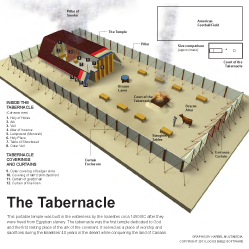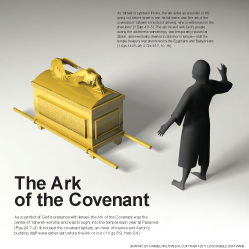20:1–48 War with Benjamin erupts in response to the heinous crime that the inhabitants of Gibeah committed in ch. 19. The 11 opposing tribes nearly annihilate Benjamin entirely. The account of chs. 19–21 emphasizes the moral degradation of Israelite society that occurred when there was no centralized civil authority in Israel. In this way, the narrative promotes the idea of kingship, but the negative portrayal of the tribe of Benjamin indicates disapproval of the kingship of Saul, who was also a Benjaminite (see 1 Sam 19:25). Further, the negative characterization of Ephraim in ch. 19 suggests a subtle critique of the northern kingdom of Israel in contrast with Judah, the southern kingdom (compare note on 19:1). These emphases indicate the narrative reflects a perspective favoring Davidic kingship (from Judah), written after the division of Israel into the northern and southern kingdoms. |
20:1 from Dan to Beersheba An idiomatic phrase for the northern and southern extent of the promised land.
the land of Gilead The tribes in the Transjordan.
to Yahweh The phrase used here likely indicates the presence of some sort of sanctuary.
at Mizpah A different Mizpah from the one in the Transjordan associated with the judge Jephthah (11:11). This location is a little less than three miles from Gibeah. Samuel also summoned Israel to gather at Mizpah when he proclaimed Saul as the first king of Israel (1 Sam 10:17–27). The site is tentatively identified as modern Tell al-Nasbeh.
20:2 four hundred thousand sword-bearing infantry On the inordinately high number of foot soldiers, see note on Num 1:46.
 Large Numbers in the Exodus and Wilderness Journey
Large Numbers in the Exodus and Wilderness Journey
all the tribes of Israel Except Benjamin, the target for retaliation.
20:3 had gone up to Mizpah See Judg 20:1 and note. Since Mizpah and Gibeah were so close to each other, Gibeah likely sent word to other Benjaminite cities that the army was gathering at Mizpah.
20:4–7 The Levite summarizes the events from 19:14–30. Presumably he had sent a message with the body parts of his dead concubine (19:28–30), but now the group wants an explanation of what happened that warranted summoning everyone to Mizpah. |
20:4 the husband of the murdered woman See 19:28 and note.
I came to Gibeah See 19:11–22; note on 19:12; note on 19:13.
20:5 and she died See 19:22–29; note on 19:28; note on 19:29.
20:7 Make your decision and advice here The wording here mimes that of 19:30.
20:8 as one body The tribes are united in their resolve to punish Gibeah, which has committed an “outrage” (v. 10) and an “evil” (v. 12).
20:9 by lot The people cast lots as a means of determining Yahweh’s will; this and v. 27 implies that Yahweh supports the punishment of the city of Gibeah. Sending only part of their fighting force at once also echoes Joshua’s initial failed campaign at Ai (Josh 7:1–5).
 Old Testament Theology and Divination
Old Testament Theology and Divination
20:13 the perverse lot, who are in Gibeah See Judg 19:22 and note.
so that we may kill them The coalition first asks for local authorities from Benjamin to turn over those guilty of the offense.
Benjamin were not willing to listen The demand of v. 13 is ignored. See v. 14 and note.
20:14 battle against the Israelites The people of Benjamin foolishly choose war against the rest of Israel instead of handing over the people responsible for the crime.
20:15 twenty-six thousand sword-wielding men The army of Benjamin is dramatically smaller (see vv. 2, 17).
20:16 who were left-handed Being left-handed gave this group of Benjaminites an usual advantage in war—their striking and throwing hands were the opposite of what would be expected (compare note on 3:15; note on 3:16). This helps explain the Benjaminites ability to defeat the Israelites twice, even though the Israelite force is drastically larger (vv. 17, 21, 25).
could sling with a stone at a hair Despite the elite status of Benjamin’s military force, the odds are hopelessly against them.
20:17 all were warriors They were trained soldiers.
20:18 went up to Bethel The tribes inquire of Yahweh about the decision to go to battle against Benjamin. The high priest kept the Urim and Thummim (see Num 27:21; 1 Sam 14:41) in his ephod (see Exod 28:30; Lev 8:8).
(see Num 27:21; 1 Sam 14:41) in his ephod (see Exod 28:30; Lev 8:8).
And Yahweh said, “Judah will go first Yahweh responds by endorsing the punishment of Benjamin, instructing Judah to take the lead. Judah’s primacy should be no surprise, as Judg 17–21 serves as a polemic for kingship (see note on 17:1–3). Judah is the tribe of David, the ideal king; the tribe of Benjamin, the tribe targeted for punishment, is the tribe of Saul—the king who seeks to kill David.
20:19 the Israelites got up The army embarks promptly once they know God’s will.
20:20 against them for battle at Gibeah The battle naturally takes place at Gibeah, where the offense occurred and where the Israelite army first sought the surrender of the original offenders (vv. 12–13).
20:21 they struck down on that day twenty-two thousand men Despite being vastly outnumbered, the Benjaminites win the first two encounters—killing 40,000 (see v. 25).
20:22 in the place The gesture shows Israel’s determination.
20:23 and inquired of Yahweh The people ask God for help against Gibeah. They are second-guessing the decision to go up; they expected a victory since Yahweh endorsed the attack. The failure reinforces that the victory will not be by their superior numbers but by God’s help (compare v. 28). God will, however, let them learn this lesson once more.
20:27 inquired of Yahweh After the second defeat, they return to confirm that their attack is indeed supported by Yahweh (compare v. 23). The account here contains echoes of Israel’s initial failure to capture Ai (Josh 7:1–5). They expected a victory and met with defeat. In response, Joshua sought Yahweh’s will before the ark of the covenant (Josh 7:6–9).
the ark of the covenant of God was there The presence of God was associated with the ark of the covenant. See Exod 25:10 and note.
See Exod 25:10 and note.
20:28 I will give them into your hand The first time God explicitly promises victory.
20:29–48 Israel’s ultimate victory over Gibeah, recounted in Judg 20:29–48, echoes Joshua’s victory over Ai (compare Josh 8:1–29). The basic strategy for both victories is the same: feign retreat to draw the warriors out of the city and wait for an ambush force to take the city once the defenders are away. |
20:30 on the third day Each engagement occurred on separate days.
20:31 they lured them away from the city The same thing happened at Ai (Josh 8:16–17). According to Judg 20:40, the army signals the ambush with smoke. See vv. 32–34; compare vv. 36–48.
20:32 lure them away from the city Some of the foot soldiers will act as a decoy (compare Josh 8:3–6).
20:33 all the men of Israel got up According to Judg 20:40, the army signals the ambush by smoke.
charged from their places The united Israelites spring their ambush from two locations.
20:35 destroyed on that day twenty-five thousand one hundred men of Benjamin This is a near total annihilation. Less than 1,000 adult males now remain in Benjamin. Compare v. 15.
20:42 those who came from the cities Inhabitants of nearby cities help to destroy the Benjaminite army.
20:44 eighteen thousand men from Benjamin fell Verses 44–45 breaks down the 25,100 of v. 35 into the approximation of 18,000 here, then the 5,000 and 2,000 of v. 45.
20:46 twenty-five thousand sword-wielding men A discrepancy exists between this number and the 25,100 of v. 35. The number here may be an approximation. Some of the vocabulary may also refer to groups or companies of troops rather than a count of individual soldiers.
20:47 they remained at the rock of Rimmon 600 Benjaminites succeed in hiding out at a natural rock fortification.
20:48 they also set on fire all the cities that they found Other cities in Benjamin are now subject to destruction since the Benjaminites refused to surrender the guilty people of Gibeah (see vv. 12–13). This seems to indicate that the Israelites viewed this as an act of divine warfare because Yahweh had endorsed their original plans to battle against the city of Gibeah (v. 28; see note on Josh 6:16; note on Josh 6:17). However, Yahweh does not endorse their destruction of these additional cities or the actions that follow—and the Israelites seem to regret this action (Judg 21:6; compare note on 21:10).

|
About Faithlife Study BibleFaithlife Study Bible (FSB) is your guide to the ancient world of the Old and New Testaments, with study notes and articles that draw from a wide range of academic research. FSB helps you learn how to think about interpretation methods and issues so that you can gain a deeper understanding of the text. |
| Copyright |
Copyright 2012 Logos Bible Software. |
| Support Info | fsb |
 Loading…
Loading…


